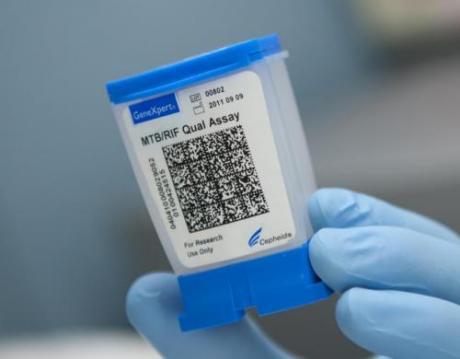You are here
Rapid Ebola test is focus of NIH grant to Rutgers scientist
Mon, 2014-12-08 23:11 — mike kraftREPORTS Of RESEARCH ON TWO METHODS OF RAPID TESTING FOR EBOLA
(Two items, scroll down)
MEDICAL PRESS Dec. 8, 2014
Rutgers researcher David Alland, working with the California biotechnology company Cepheid, has received a grant of nearly $640,000 from the National Institutes of Health to develop a rapid test to diagnose Ebola as well as other viruses that can cause symptoms similar to Ebola.

Researchers will adapt this cartridge, now used worldwide for tuberculosis screenings, to collect and test samples from potential Ebola patients. Credit: John Emerson
Alland, a professor of medicine and associate dean for clinical research at Rutgers New Jersey Medical School and the principal investigator of the project, says health workers would be able to take the test to small villages and other remote locations where the spread of Ebola has been especially rampant and diagnose patients where they live...
Alland and Cepheid previously used technology similar to the planned Ebola test to develop a rapid test for tuberculosis (TB) that is now widely used in impoverished areas of the world.
The TB test on which the new diagnostic will be modeled was endorsed by the World Health Organization for worldwide use in 2010 and approved by the Food and Drug Administration last year for use in the United States. That test employs a small cartridge where a sample of a patient's sputum is placed, which is then loaded into a machine for analysis. The result is available within two hours.
Read Complete article.
http://medicalxpress.com/news/2014-12-rapid-ebola-focus-nih-grant.html
-0-
A new paper diagnostic for Ebola
MIT NEWS by Anne Trafton Dec. 2, 2014
CAMBRIDGE, MA- Once a patient infected with the Ebola hemorrhagic virus starts showing symptoms, it can take several hours under the best conditions, and up to several days in remote areas, to get diagnostic results using conventional tests, such as identification of viral RNA. Further complicating the process, Ebola symptoms are very similar to those of other fevers, such as typhoid and malaria.
Because time is of the essence in tracking Ebola and preventing its spread, researchers at MIT’s Institute for Medical Engineering and Science (IMES) are working on a new device that uses nanoparticles to capture the virus in patient blood samples and would offer much faster results. Lee Gehrke, the Hermann von Helmholtz Professor in IMES and a professor of microbiology and immunology at Harvard Medical School, described the project to MIT News
See complete release:
http://newsoffice.mit.edu/2014/3-questions-lee-gehrke-paper-diagnostic-ebola-1203

Recent Comments